
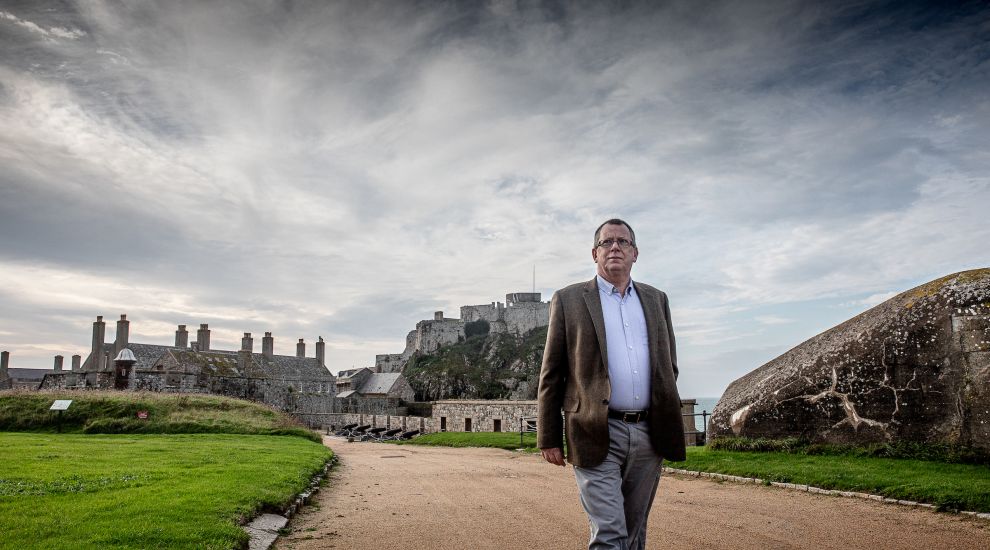
In years like 2020, which are redolent with disruption, confusion and sudden change, it is easy to believe that we have no idea what the future will hold. Yet, a map of the future is always with us in our past, if we would only take the time to look.
We understand this instinctively, it is part of the reason that whenever we look for a symbol of our identity, we commonly reach for a heritage site, like one of the castles. We know that they still have a deep relevance for the future.
But when it comes to securing public funding, ‘the immediate’ can trump ‘the important’ – which is what we saw in the proposed new Government Plan, which cut promised funding for Elizabeth Castle, apparently with no prior consultation with Jersey Heritage.
The island’s politicians are beginning their debate on that plan today. Here, Tim Brown, Chair of Jersey Heritage, explains what they had hoped to do with perhaps the island’s most iconic site...
“Elizabeth Castle is an important heritage site for Jersey and the British Isles. It is unique, playing an important role in the history of the island. After 40 years of unfulfilled promises, it is time that this collection of buildings is preserved for future generations, used for education and be a place for well-being.
Monies spent on Elizabeth Castle are spent on businesses and jobs in Jersey and bring in funding from the UK and Europe. As has been seen in 2020, they are enjoyed by the people of Jersey: membership has been at an all-time high.
The longer-term plans for the Castle include the refurbishment of a large group of buildings that visitors are currently unable to access. We’ve not been able to address fully the restoration of these buildings since damaging changes were made during the German Occupation.
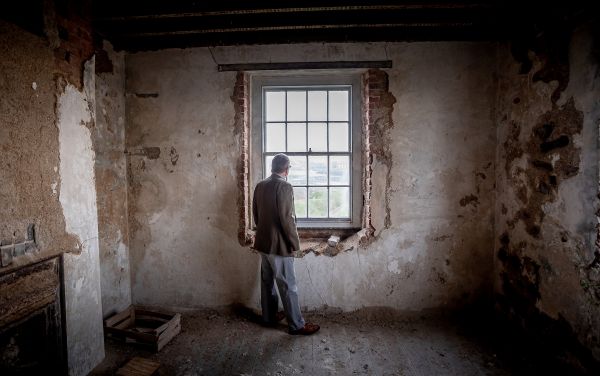
Pictured: Long term plans for the Castle include various refurbishments.
Our immediate plans are for the refurbishment of the Hospital Block and the Officers’ Quarters, having been identified as priorities in the report of the UK Inspector of Ancient Monuments in 1980 (when the Crown – through the UK Home Office - still retained an interest in the Castle prior to the States asking for responsibility). The cost of this work is around £6M. £3.69M had been identified in the 2020 Government Plan towards this.
The Hospital Block (a rare and significant building) would be presented as a Victorian military hospital as part of the heritage attraction during the summer season. The outbuildings would house toilet and catering facilities to support events on the Green. The Officers’ Quarters, would be restored to their original form as accommodation. During the summer, the Quarters would be presented as part of the heritage attraction, as well as being used as self-catering accommodation as part of our Heritage Lets scheme. In the winter, while the Castle is closed to visitors, the Quarters would be available as group accommodation for organised retreats and associated with the facilities created in the Hospital Block.
This would enable for the first time, year-round use of the Castle, currently economically and culturally redundant during the winter months.
Removal from the Government Plan means our plans cannot go ahead, although we have invested considerable resources with partners on the assumption that funding was available.
There was plenty of dialogue about the inclusion of the project including a well-attended presentation to States Members in 2017 organised by the then Assistant Minister Murray Norton. Following inclusion there was initial discussion with officers on approaches to planning, but no advance warning that the funding was going to be removed from the Plan.
One of our biggest frustrations, and I am sure this is true for many other organisations, is the lack of transparency of process and decision making.
Timescales to get things submitted seem to be rushed, but decisions elongated. We understand there are lots of competing demands for funds, but we would have thought as the government’s funded heritage body, Jersey Heritage would be an integral part of discussions on heritage priorities and not, as is seemed, kept at arm’s length.
The Castle is our most visited historic site and visitor-use has grown. We promoted the Love Your Castle Campaign in support of the restoration project. Jersey Heritage raises very significant revenue towards the never-ending job of maintaining all the buildings and facilities at the Castle but without Government investment, the substantial restoration work cannot be undertaken, and the opportunities will remain unrealised.
In a normal year Jersey Heritage raises over 50% of its annual budget commercially, mainly from visitors, memberships, patrons and events. This has been necessary as funding from government has declined in real terms over the years. Even with this funding and in a normal year, Jersey Heritage does not have the funds to invest in restoring Elizabeth Castle. As owned by the States, it has the responsibility to preserve and protect.
Waiting is fine in principle – these buildings on Elizabeth Castle have been waiting 40 years since the Assembly first approved the principle of investment, after all. What is not fine is waiting indefinitely without an element of timing and certainty around which we can plan with partners, and the community, to achieve these aims.
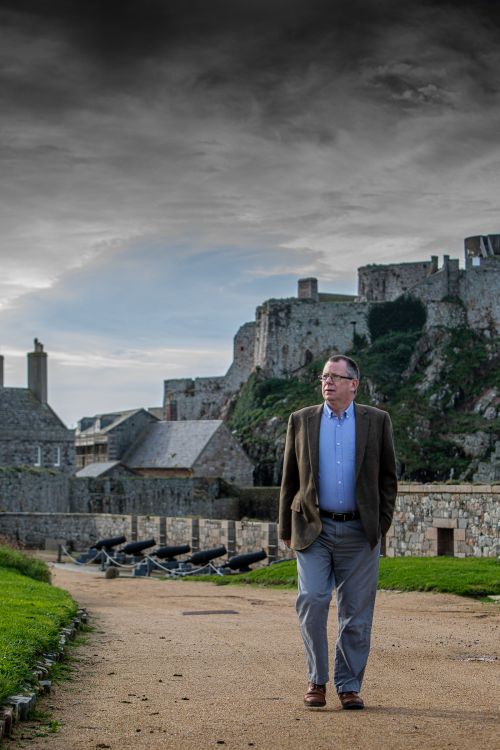
Pictured: "Elizabeth Castle is our most visited historic site."
It is difficult for culture to compete with all the other Government priorities, as demonstrated by Deputy Tadier’s landmark 1% proposition, which was approved by the Assembly, but voted against by the Chief Minister and Treasury Minister. Part of the reason for this is that cultural provision has grown up in Jersey outside Government. That arms-length principle has tremendous advantages in financial, governance and community terms. But perhaps it has enabled the Government in Jersey to think that culture is not something government ‘does.’ That is an unfortunate impression because the Government has considerable responsibilities towards heritage in international conventions and local legislation. Jersey Heritage can and does help with that, not least raising half the cost of operating the public service. But the Government retains those important responsibilities as the proprietor/landlord in many cases (including the castles) and the commissioner of services for public benefit. There has been an over emphasis in the relationship with the sector on financial and governance issues and not enough on strategy and policy, benefit and value.
In the UK cultural organisations can get funding from a number of sources – particularly the National Lottery Heritage Fund – which do not apply in Jersey. There has not been a successful effort to put in place a Jersey equivalent.
The Tourism Development Fund, currently in abeyance, paid for investment in the Maritime Museum and Mont Orgueil and Ice Age Island, but against commercial, rather than heritage, criteria. The absence of appropriate structures takes these calls directly to Government, which seems to irritate them, but that is the price we pay for all the benefits of the constitutional arrangements including the financial services industries. With that, however, comes some obligations towards our heritage assets if we are to be seen as a responsible jurisdiction honouring our heritage of international significance.
Good question. We have lost almost 50% of our commercial funding this year and have had to make cuts to the tune of £1.25m. The community has stepped up with Membership and visits, even an increase in retail revenue. Government has also filled the remaining gap by an additional grant. Whilst next year may see higher visitor numbers it is unlikely to be back to the 2019 numbers and we will both have to ‘cut to the bone’ and seek top up funding just to stay still. However, it needs to be remembered that standing still on 2020 funding, based on a 25% cut, means we go backwards.
Let’s be clear the £3.6m for the hospital block and officers’ quarters at Elizabeth Castle is important, but my fear is that if found, the feeling of the Assembly will be that they’ve “done heritage” for another 40 years.
The financing of heritage, and culture and arts, are in a perilous state. Their role in the regeneration of business, jobs, community and well-being are under-rated. We need a proper conversation with decision makers within government. At the moment our messages and questions and challenges are funnelled up and filtered through layers of bureaucracy before they reach the Minister or Council of Ministers, and the experts are not invited.
Rather than wait until there is another funding crisis next year, we need a sensible discussion now?
There has been some unavoidable pause in maintenance programmes, some of it purely practical – e.g. we need to re-thatch Hamptonne, but the thatcher could not get here this year. There are other proposals we are discussing, including the new museum at Hamptonne, first proposed in the 1990s, the refurbishment of the 1992 Jersey Museum and the 1978 La Hougue Bie archaeology gallery. But ultimately, in the longer term, with the 1% we can see a way through to addressing them, but Elizabeth Castle is in its own class as a problem.
The benefits of the strategic partnership with Jersey Heritage are obvious – we are delivering north of 200k visits annually as the most visited island tourist infrastructure, huge membership, volunteering and community support, high profile research projects, wide educational engagement etc, etc. There is scope to improve how Government itself is organised to manage that strategic partnership and the heritage strategy will look at that.
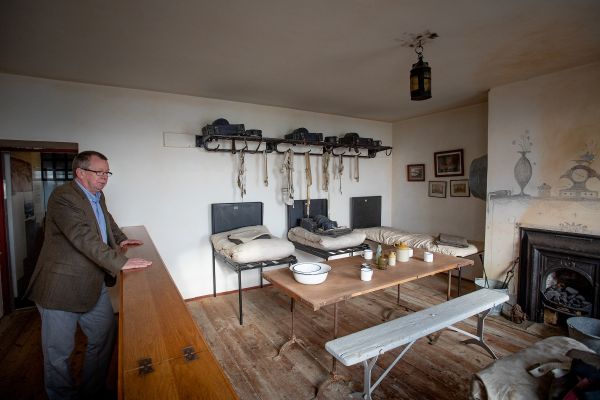
Pictured: Jersey Heritage is the most visited island tourist infrastructure.
On the mindset – I do think there is a problem with a Civil Service ‘regime’ deeply at odds not only with the Assembly but also the community on the significance of heritage. The mindset is one that sees the very idea of ‘heritage’ as in the way of development; listed buildings, antiquated institutions, backwards looking, introspective, parochial etc. Whereas ‘arts’ are creative, commercial, modern, forward looking etc. That is completely at odds of course with how the community feels, as supported by the evidence of engagement and opinion data.
Maybe this is how we have presented ourselves, but heritage is at the heart of the future of Jersey. It plays an important role in its identity, brand and story. Investment in it goes to Jersey businesses and jobs and its enjoyment is in the island by adults and children alike. Islanders have shown time and again how much they value heritage, and this must be recognised by Government. After all we have 15,000 current and future voters as members.
I have been involved in Jersey Heritage ever since I came to the island in 2014. Every year it has been about trying to do more with less. The international standards achieved by the team at Jersey Heritage with so little has been remarkable: staff, volunteers, patrons, members, etc, all playing their part enabling us to punch above our weight.
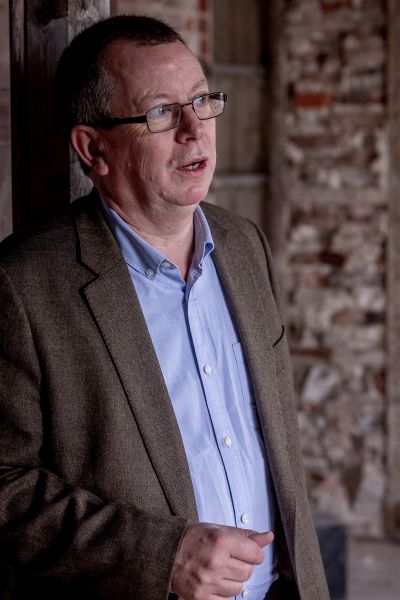
Pictured: Tim Brown has been involved with Jersey Heritage since he came to the Island in 2014.
March of this year seemed the dawn of a new era: Senator Farnham had commissioned Jersey Heritage to lead the develop of a new island-wide heritage strategy; we had a new modern constitution ready at some time for Assembly approval; there was every chance that Jersey would step up to its international obligations, with new heritage laws, for so long neglected; the 1%, although how it would be distributed was still unknown, gave a better foundation for the long-term funding than seen for decades; and the Government had stepped up to its obligations on capital projects such as Elizabeth Castle.
My goodness, what a difference a few months make.
I recognise acutely the competing demands on limited funds and heritage has to be part of wider decisions.
So, what do I want for 2021? It would be easy to say money, but actually there is something more fundamental I want to see. That there is a recognition of the importance of heritage in everything we do: our brand, our identity, our culture. As such it has a right to be at the table when decisions are made, and it is recognised that heritage is actually about the future of Jersey.
…. and can we have the money for Elizabeth Castle please?
This article first appeared in Connect Magazine. Read it in full HERE.